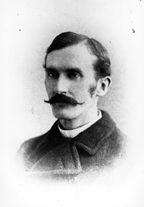Distinguished Faculty AwardCHARLES JOHN ROSE '76

CHARLES JOHN ROSE '76
Member of the faculty
1881-1913
Charles John Rose was born October 13, 1853, the last child of Charles Alexander Rose, a gentleman from Clyde, New York. As the youngest of six living children, he learned early on the vicissitudes of farming, and chose instead a life of study and teaching. He thought Latin was more difficult than Greek, but mastered both as evident from his graduation from Hobart in 1876 with Phi Beta Kappa honors. He subsequently earned his B.S. in 1878 and Master of Arts in 1885. Between 1876 and 1879 he studied music at the Royal Conservatory in Stuttgart, Germany.
In the fall of 1881, C.J. Rose assumed a position in the Department of Modern Languages and History at Hobart. He spent a year in Berlin and a year at Dresden during the 1880s, furthering his studies and completing his master’s degree, but he always returned to his teaching post at Hobart where he remained until 1913 when he retired in ill health at age of 60.
The book “Roses of Geneva” describes him as follows: “Witty and urbane, ‘C.J.’ was a great favorite at Hobart. He was heard to tell his students that they should consider him not as an example, but as a warning! He enjoyed having his first-year students present lectures on English history, proving to his delectation that his teaching was bearing fruit.”
Musicals at his home were very popular. Under his tutelage, the Hobart Glee Club was pronounced “excellent.” For many years he served as official organist for Trinity Church.
Hobart’s Herald throughout his career made frequent mention of his many and various contributions to life on the campus. His civility and grace in dealing with his students made him popular and gave him the opportunity to influence students in their self-improvement. They learned by example and accepted his lessons gladly.
The faculty minutes upon his death reflect what was prized most about Professor Charles John Rose: “[he was prized most] for his sincere and upright character, the grace and distinction of his manner, the incomparable charm of his bon homme, his spontaneous humor, his sparkling conversation which revealed the experience of the man of the world, the traveler who had never wandered from fast anchorage of fidelity to home and friends and the principles of a Christian gentleman.”
Professor Rose and his family enjoyed frequent trips to Europe and changed residence in Geneva with some frequency. Professor Rose suffered chronic medical problems himself, and required surgery while in Paris on one occasion. He retired from teaching in 1913 and lived his last two years 543 South Main Street where he died of Bright’s Disease on June 29, 1915.
